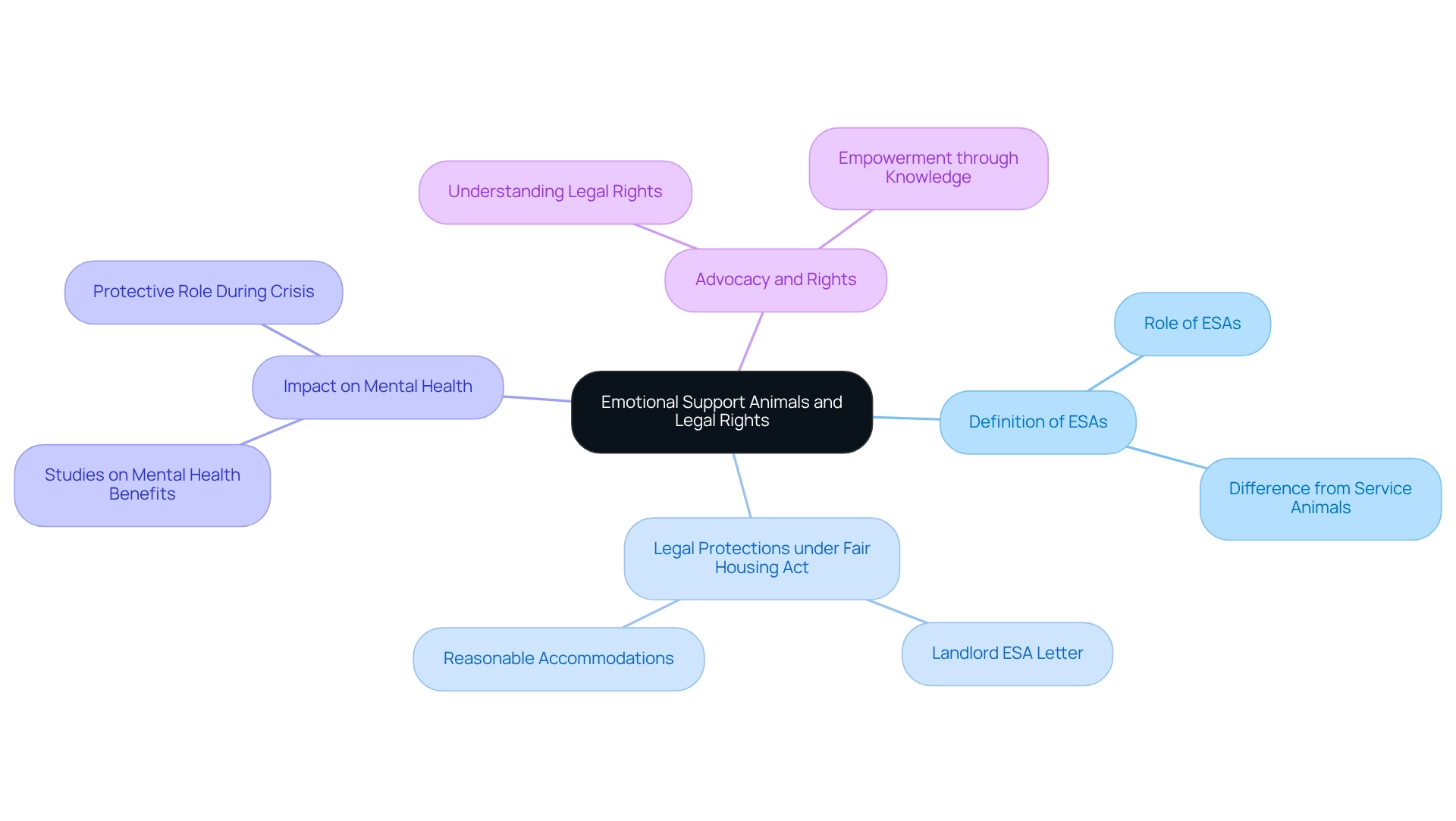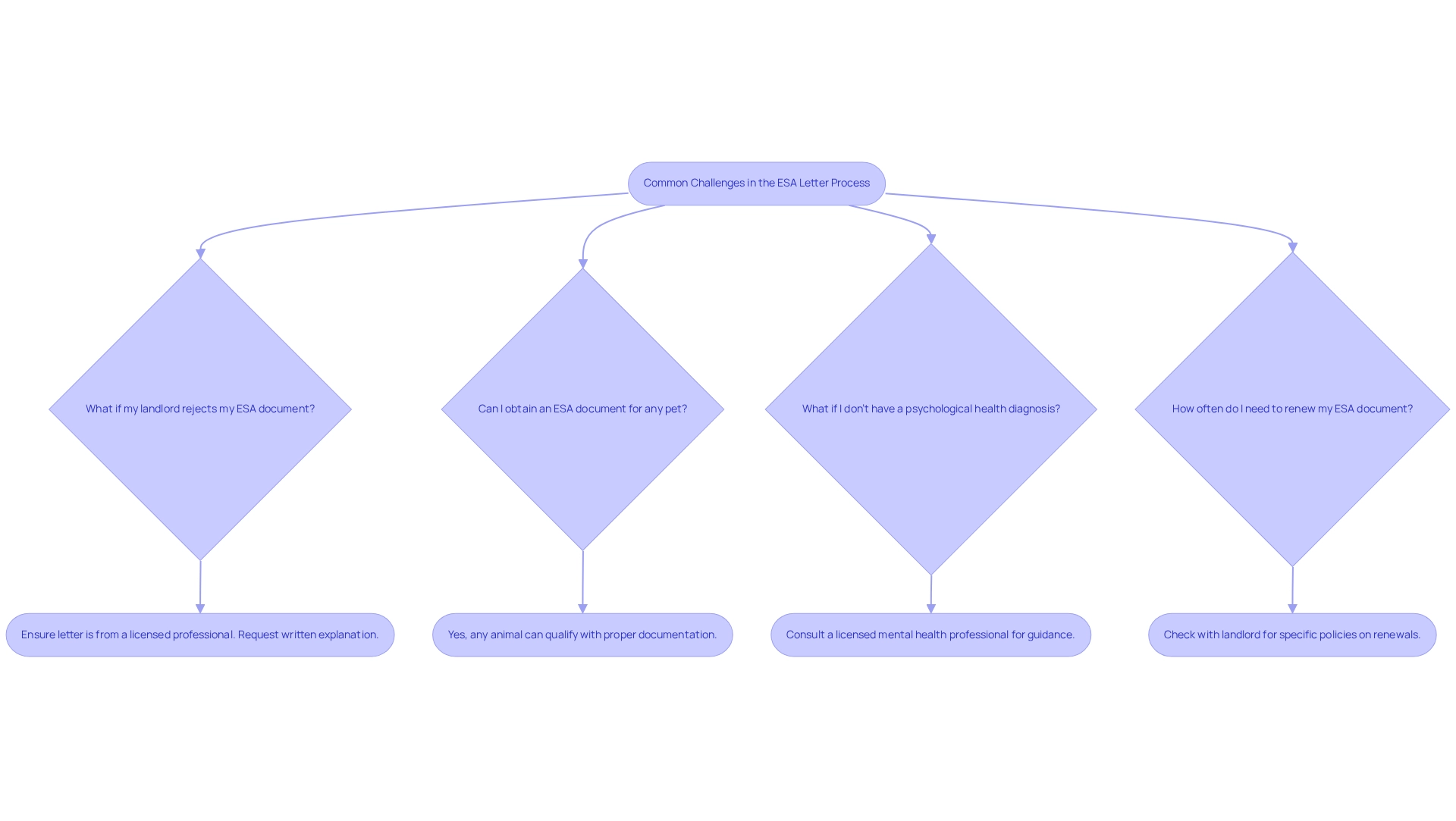

5 Steps to Obtain Your Landlord Emotional Support Animal Letter
by Lena Park
Last updated: July 9, 2025
Verified and Approved by:
Angela Morris,
MSW, LCSW
Fact Checked

Overview
Navigating the journey of mental health challenges can be incredibly daunting. For many, the emotional burden can feel overwhelming, leaving individuals in search of support and understanding. One compassionate solution that can make a significant difference is obtaining an emotional support animal (ESA) letter. To begin this process, individuals should:
- Gather the necessary documentation
- Complete an online assessment
- Consult with a licensed mental health professional, such as those offered by Wellness Wag
Having the right documentation is not just a formality; it plays a crucial role in ensuring compliance with the Fair Housing Act and in facilitating the emotional support that ESAs provide. Understanding your rights and the steps involved in the application process can empower you on this journey. Remember, you are not alone in this, and there are supportive resources available to guide you through the process.
Reflect on how an ESA could enhance your emotional well-being. The bond you share with an animal can bring comfort and companionship, helping to alleviate feelings of loneliness and anxiety. As you consider this path, know that the support you seek is within reach, and taking these steps can lead to a brighter, more hopeful future.
Introduction
In a world where emotional well-being is increasingly recognized as vital, Emotional Support Animals (ESAs) have emerged as essential companions for those grappling with psychological challenges. These loving animals provide comfort and stability, often transforming the lives of their owners in profound ways.
It’s important to understand the legal rights associated with ESAs, particularly under the Fair Housing Act, for individuals seeking to live harmoniously with their furry friends, especially in environments that typically restrict pet ownership. As awareness of these rights grows, so does the significance of proper documentation and the process of securing an ESA letter.
This article gently explores the essential aspects of ESAs, from understanding their legal protections to navigating the application process, ensuring that individuals are well-equipped to advocate for their emotional support needs.
Have you ever felt overwhelmed by life’s challenges? You are not alone, and there is support available to help you through.
Understand Emotional Support Animals and Their Legal Rights
Emotional Support Animals (ESAs) serve as vital companions for those facing emotional or psychological challenges, offering comfort and support without requiring the specialized training that service animals do. Under the Fair Housing Act, individuals with ESAs can obtain a landlord emotional support animal letter, which allows them to live with their animals in housing that usually restricts pets.
This important legislation mandates that landlords provide reasonable accommodations for tenants with valid ESA documentation, which includes the landlord emotional support animal letter, ensuring that individuals can maintain their emotional support systems in various living situations. Understanding these legal rights is crucial for anyone wishing to live with an ESA, as it empowers them to navigate housing circumstances and assert their rights when necessary.
Recent studies reveal the profound impact of ESAs on mental health, particularly in difficult times, with individuals lacking ESAs being nearly twice as likely to experience a decline in their mental well-being compared to those who have them. This highlights the protective role that ESAs can play in enhancing emotional health, and as awareness of ESAs continues to increase, it is vital for tenants to familiarize themselves with their rights under the Fair Housing Act, which includes the ability to request reasonable accommodations and the necessity of providing a landlord emotional support animal letter as appropriate documentation.
By understanding these rights, individuals can advocate for themselves and ensure that their emotional support needs are met in their living environments. At Wellness Wag, we are committed to empowering individuals through accessible Emotional Support Animal Letters, guiding them on their journey toward a brighter, more fulfilling life.

Gather Necessary Documentation for Your ESA Letter
Obtaining your landlord emotional support animal letter can be a vital step in addressing your emotional needs, and gathering the right documents is essential for this process. It’s important to start with your Personal Identification, which should include your full name, current address, and date of birth to verify your identity. Next, consider your Medical History; a brief overview of your psychological health, including any diagnoses, will help substantiate your need for an ESA.
If you’ve consulted with a mental health professional in the past, include their contact information along with any relevant notes that can support your application. Additionally, if you already have a pet, providing documentation such as adoption papers or veterinary records can serve as proof of ownership.
With these documents prepared, you can move forward with your application for a landlord emotional support animal letter confidently. The process is designed to be efficient, and with the right documentation, you can often expect a quick turnaround time, typically within 24 to 48 hours, especially when connecting with licensed professionals online. This efficiency is particularly important for those living in environments with strict pet regulations, facilitating timely access to the emotional support that ESAs provide, as outlined in the landlord emotional support animal letter.
The therapeutic benefits of emotional support animals are well-established, especially in helping individuals manage conditions such as anxiety and PTSD. Therefore, having the proper documentation is crucial for those seeking this type of companionship.
After gathering your documents, we encourage you to take our quick assessment to share your situation and emotional support needs. This step will help us tailor our services to your unique circumstances regarding your ESA. Finally, connecting with a licensed professional who can guide you through the application process is the next step towards receiving the compassionate support you deserve.
Apply for Your ESA Letter Through Wellness Wag
Navigating mental health challenges can be overwhelming, and having a landlord emotional support animal letter can facilitate the support of an emotional support animal (ESA), making a significant difference in your life. To help you acquire your ESA document through Wellness Wag, we’ve outlined a simple and compassionate process:
- Visit the Wellness Wag Website: Begin your journey by accessing the dedicated ESA letter section, where you can find the support you need.
- Complete the Online Assessment: Take a moment to fill out a brief questionnaire that focuses on your psychological health needs and the role your pet plays in your life. This assessment is essential for determining your eligibility for a landlord emotional support animal letter, ensuring your unique situation is understood.
- Schedule a Consultation: Once your evaluation is complete, you will be matched with a licensed health professional for a consultation. This can be done through a phone or video call, providing you with expert guidance tailored to your specific needs and circumstances.
- Receive Your ESA Letter: If approved, your official ESA letter will be delivered within 24 hours. It’s important that the landlord emotional support animal letter is printed on official letterhead and includes vital details such as your name, the date, and the mental health professional’s signature. For states with specific regulations, please allow up to 30 days as required by law.
This efficient process not only facilitates access to the necessary documentation but also aligns with current regulations, ensuring your rights are protected under the Fair Housing Act and Air Carrier Access Act. With over 50,000 patients served, Wellness Wag stands as a trusted resource for individuals seeking the emotional support that their pets provide. Remember, you are not alone in this journey; help is available, and your emotional well-being matters.
Navigate Common Challenges and FAQs in the ESA Letter Process
Navigating the process of obtaining an Emotional Support Animal (ESA) document can indeed be challenging and emotionally taxing. Many individuals face uncertainty and stress in this journey. Here are some frequently asked questions that may resonate with your experience, along with compassionate solutions:
-
What if my landlord rejects my ESA document? It’s important to ensure that your landlord emotional support animal letter is issued by a licensed mental health professional and includes all necessary details. If your landlord refuses, kindly request a written explanation for their decision. This can be a frustrating situation, and seeking legal advice may empower you to understand your rights under the Fair Housing Act.
-
Can I obtain an ESA document for any pet? Yes, any type of animal can qualify as an ESA, as long as you have a letter that clearly states your need for that specific animal. This documentation, the landlord emotional support animal letter, is essential for ensuring your pet’s acceptance in housing situations, alleviating some of the stress you may feel about your living arrangements.
-
What if I don’t have a psychological health diagnosis? You may still be eligible for an ESA if you can demonstrate that the animal provides emotional support. It can be helpful to consult with a licensed mental health professional who can clarify your situation and guide you through the process, offering reassurance during this time.
-
How often do I need to renew my ESA document? Generally, ESA documents do not have an expiration date. However, it is wise to check with your landlord or housing provider regarding their specific policies, as some may require periodic updates. Knowing this can help you feel more prepared and secure in your living situation.
Understanding these common challenges can empower you to navigate the ESA letter process more effectively. With the increasing reliance on ESAs for mental health support, it is essential to have the landlord emotional support animal letter and be informed about your rights and the necessary documentation. Remember, you are not alone in this journey, and there are supportive resources available to help you every step of the way.

Conclusion
Emotional Support Animals play an invaluable role in enhancing the well-being of individuals facing emotional and psychological challenges. It’s essential to recognize the struggles that come with these challenges. Understanding the legal rights associated with ESAs, particularly under the Fair Housing Act, is crucial for ensuring that individuals can live harmoniously with their companions. The right to reasonable accommodations and the importance of proper documentation empower tenants to advocate effectively for their needs, highlighting the significance of being informed.
The process of obtaining an ESA letter is designed to be streamlined and accessible, requiring essential documentation that supports one’s emotional support needs. Have you ever felt the weight of loneliness in a restrictive environment? By following a clear application process, individuals can quickly secure the validation necessary to enjoy the companionship of their ESAs, regardless of housing restrictions. This timely access is particularly vital for those in environments with strict pet policies, as the therapeutic benefits of ESAs can significantly impact mental health.
Navigating potential challenges in the ESA letter process becomes easier with knowledge and preparation. Understanding common questions and concerns can help individuals take proactive steps to ensure their rights are upheld. As the recognition of the importance of emotional support continues to grow, so does the opportunity for individuals to embrace the comfort and stability that Emotional Support Animals provide. Imagine a life enriched by the companionship of an ESA, ultimately leading to a more fulfilling and supported life. You are not alone in this journey; support is available to guide you every step of the way.
Frequently Asked Questions
What is the purpose of Emotional Support Animals (ESAs)?
Emotional Support Animals (ESAs) provide comfort and support to individuals facing emotional or psychological challenges, without the need for specialized training like service animals.
What legal protections do individuals with ESAs have under the Fair Housing Act?
Under the Fair Housing Act, individuals with ESAs can obtain a landlord emotional support animal letter, allowing them to live with their animals in housing that typically restricts pets. Landlords are required to provide reasonable accommodations for tenants with valid ESA documentation.
How can a landlord emotional support animal letter help tenants?
A landlord emotional support animal letter serves as documentation that enables tenants to request reasonable accommodations to keep their ESAs in housing where pets are usually not allowed.
What impact do ESAs have on mental health?
Studies indicate that individuals with ESAs are less likely to experience a decline in their mental well-being compared to those without them, highlighting the protective role ESAs can play in enhancing emotional health.
Why is it important for tenants to understand their rights regarding ESAs?
Understanding their rights allows tenants to navigate housing situations effectively and advocate for themselves to ensure their emotional support needs are met.
What services does Wellness Wag offer related to ESAs?
Wellness Wag provides accessible Emotional Support Animal Letters and guidance to individuals seeking to understand and exercise their rights regarding ESAs.
Certify Your Emotional Support Animal Today

Why You Can Rely on Us?
At Wellness Wag, we believe your pet deserves care rooted in both science and compassion. Each article is carefully researched, written in clear language for pet owners, and then reviewed by qualified professionals to ensure the information is evidence-based, current, and practical for real-life care. Our goal is to help you feel confident in making informed decisions about your pet’s health and well-being.
Reviewed by
Angela Morris, MSW, LCSW
Angela is a licensed clinical social worker with 20 years of experience in patient advocacy and community mental health. She has assisted numerous clients with ESA evaluations and brings a deep understanding of disability accommodations, ensuring that all information is accurate, supportive, and practical.

Written by :
Lena Park
Last Updated :
July 9, 2025












